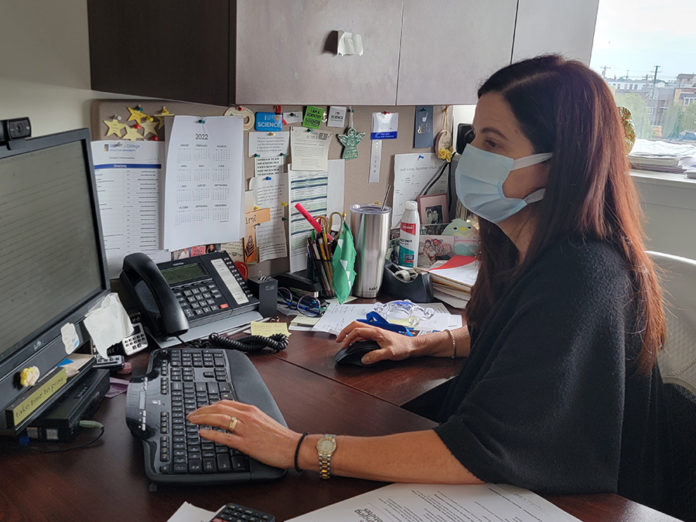
We are two local youth who are involved with the new Our Voices, Our Vaccines project, and we sat down with Dr. Nilsa Graciani. Dr. Graciani, who asked us to call her by her first name, Nilsa is Esperanza’s Chief STEM Officer and Esperanza College’s Director of STEM and Medical Assisting. She has her Ph.D. in Bio-organic chemistry and has previously worked in the pharmaceutical industry conducting research in peptides also known as proteins. Nilsa is on the Occupational Advisory Committee (OAC) at Kensington Health, OAC at Franklin Learning Center, and OAC at Thomas Edison High School. She is on the Community Advisory Board at Fox Chase Cancer Center and the co-chair of the Stakeholder Advisory Board for the Philadelphia City Wide Cancer Coalition. Lastly, she is part of the advisory board of the Cities Changing Diabetes in Philadelphia and part of the post-secondary working group of the Philadelphia STEM Equity Collective.
We interviewed Nilsa because of her extensive scientific knowledge and experience. Nilsa was asked to share her thoughts about the COVID-19 vaccine with readers. During the interview, Nilsa provided insight on her own experience contracting COVID-19 after being vaccinated and boosted, why it is important to stay up to date with COVID-19 boosters, why children should get vaccinated against COVID-19, and how to cope with misinformation.
Last year Nilsa and her family contracted COVID-19 after being vaccinated and boosted. She stated that she and her family experienced mild symptoms and she attributes their mild experience with the disease to the vaccine. She was thankful that the COVID-19 vaccine helped prevent serious disease and complications in her family because she knew some close friends who had severe symptoms due to COVID-19 before the vaccine was available.

Nilsa mentioned that it is critical to get the COVID-19 booster because as time goes on our immunity decreases and the booster helps remind our immune system to fight the COVID-19 virus if we are exposed to it, which keeps our immunity strong. She explained that a lot of people understand the concept of getting the flu shot every year; however, this same idea needs to be applied to the COVID-19 boosters as well.
Nilsa also talked about the importance of vaccinating young children. She reminded us of our history in the U.S. with many deadly and infectious diseases that are now no longer present because of vaccines. She attributed the eradication of many of these diseases to early childhood vaccination. For example, chicken pox, polio, and measles are some diseases that are no longer a risk due to vaccination. Therefore, she mentioned that it is important to follow the guidelines from pediatricians and vaccinate children against COVID-19. Additionally, COVID-19 cases are rising again, along with the flu, and other illnesses such as RSV. This means that children are not safe from getting COVID-19, though getting them vaccinated can help. According to Nilsa, we have not reached herd immunity, where most of our community has developed antibodies to fight the disease and not get sick so that the larger community is protected as a whole, and young children and adults are still getting sick. With COVID it is not clear when and if we will reach herd immunity.
Nilsa also discussed misinformation about vaccines. There are rumors in our community about the vaccine being potentially magnetic or containing some type of microchip. These myths are false. When Nilsa is faced with misinformation like this, she suggests the importance of reading and referring to scientific articles and studies about the COVID-19 vaccine. These articles and studies provide scientific evidence that the vaccine is effective and safe. It is also important to talk to a medical provider, like your primary care physician, about any doubts or questions you have, so they can help you find accurate answers.
Dr. Nilsa Graciani is a wonderful asset to Esperanza, and she is dedicated to the Hunting Park community, her students, and other staff. Most importantly she is committed to using science to inform, support, and advocate for positive change. We enjoyed interviewing her and learned a lot from her, as we all can.
This article is part of Esperanza’s community COVID-19 and flu vaccine project (Our Voices, Our Vaccines), which informs and engages Latinos on public health and vaccination programs impacting their well-being.
Nilsa is not a medical doctor and the information in this article should not substitute medical advice.






















